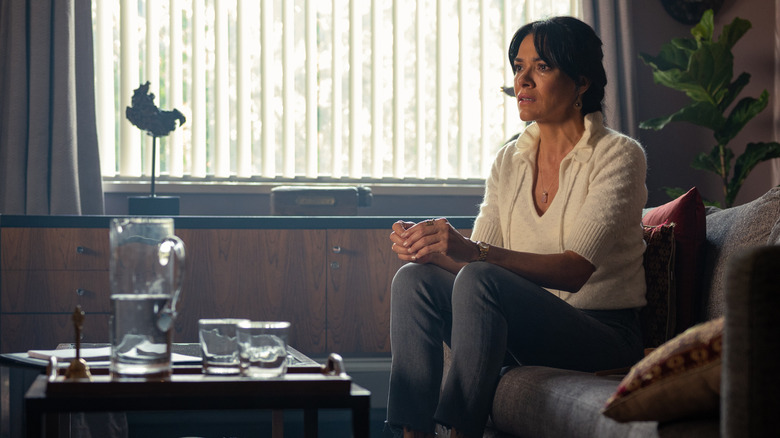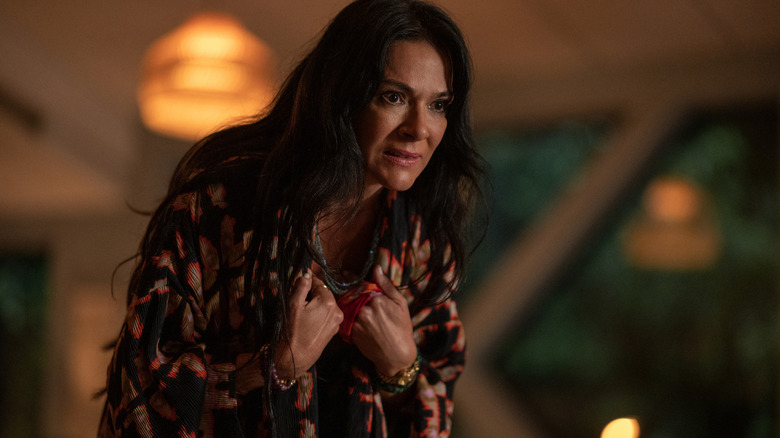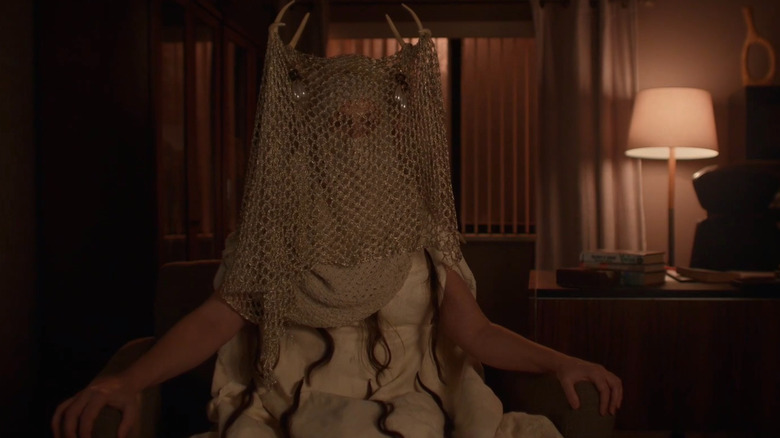Yellowjackets Season 2's Unsettling Suggestion About Lottie's Psychiatrist
This article contains spoilers for "Yellowjackets."
It has been nice to see adult Lottie (Simone Kessell) in therapy on this season of "Yellowjackets." Specifically that it's a gentle, seemingly helpful form of talk therapy. The second season opener treated us to a grim scene in which teen Lottie (Courtney Eaton), recently recovered from the wilderness, is forced into ECT (electroconvulsive therapy) by her parents, who just want a psychiatrist to "fix her." Putting aside the fact that ECT has (thankfully) profoundly evolved past the barbaric "One Flew Over the Cuckoo's Nest" style depicted in the episode, the mere act of being forced therapy by your family is traumatizing, regardless of its type.
Obviously, though, enduring what the Yellowjackets survivors had to face out there in the Rockies took its toll. Virtually every survivor has struggled to assimilate back into the mundanity of everyday life at one time or another, and we've seen several of them go to or talk about therapy. Shauna (Melanie Lynskey) attended family therapy with her husband and daughter, Natalie (Juliette Lewis) has spoken of several stints in rehab, which likely incorporated elements of cognitive behavioral therapy, and Taissa's (Tawny Cypress) estranged wife Simone (Rukiya Bernard) tells her to get help practically every time she sees her.
Each of the surviving Yellowjackets deserves to heal. Lord knows they all desperately need it, except maybe Misty (Christina Ricci), who seems disconcertingly okay? But it's been especially sweet to see Lottie work through her past, attempt to integrate it into her present, and if possible, move on. That is until this episode, where in a one-two punch, a shocking turn of events in the teen timeline revealed that Lottie might need the most help of all, and the very reality of that help in the present was fundamentally thrown into question.
The hunt
Though Lottie's therapist has seemed capable, firm, and helpful in the brief glimpses we've gotten into their sessions, we should remember — this isn't actually Lottie's therapist. In episode 4, Lottie remarks to her, "It's weird, Dr. Graham didn't tell me he was taking a sabbatical," implying that whoever she's talking to is actually a replacement, one whose appearance was a surprise.
It's easy to glide past such an innocuous line in a show where literal blood and guts are being thrown at the camera every other scene. But that little seed, planted snugly in the backs of most viewers' minds no doubt, burst forth like a wild, thorny vine from its casing to command the center of our attention this episode. The adult survivors have all finally gathered at Lottie's compound. Twin senses of foreboding and anticipation linger over a raucous night of drinking and reminiscing. A series of scenes cut into the final stretch of the episode show Lottie confiding to this therapist that she feels "a force" has drawn them all back together. The therapist asks if Lottie felt her "most authentic self" when she was in the woods; perhaps it's she who semi-consciously willed the reunion. It was the hardest time of her life, but maybe that's precisely what made it the most rewarding — the most alive she ever felt. It's dark, but fair.
Their exchange takes a turn from the dark to the strange when the therapist asks, "Tell me, is there anything of value in this life that doesn't come with risk? Or loss? Or consequence?" Lottie responds, "Are you saying what I think you're saying?" She then morphs into the Antler Queen and asks, "Does a hunt that has no violence feed anyone?" before vanishing. Uh oh.
The vessel
If you'd asked me two episodes ago which teen Yellowjacket I feared most, I'd probably have said Lottie, even though she's never once shown an inclination toward malice or violence. Lottie is fearsome not because she's potentially moving toward evil, like teen Shauna (we'll get to that), or divided between conscious good and unconscious evil, like adult Taissa, but because she exists at a state of consciousness where energy transcends good and evil. She's a conduit. Her connection to the wilderness makes her like a door, and she may not be able to discern whether good or evil is knocking. If the wilderness desires blood, Lottie may unconsciously utilize her sway over the other girls to spill it. She basically already has: cannibalism is on the menu because of her.
But "Burial" changes things. In the cabin, Lottie invites Shauna (Sophie Nélisse) to beat her to a pulp so that Shauna can exercise the grief and rage out of her system. It's a brutal scene which may suggest that Lottie's status as a vessel is more holy sacrifice than galloping avenger.
"Burial" implies that Lottie's therapist may never have existed. In fact, it implies that she may be a figment of Lottie's own imagination. Does that mean the Antler Queen has infiltrated Lottie's unconsciousness, that she's actually an emanation of Lottie's unconsciousness, or does she represent a repressed urge to start the cycle of violence over again? Every option is more agonizing and terrifying than the last. The suspicion and fear that once clouded my sense of sympathy for Lottie have lifted. And just in time: the way things are going, she's going to need it now more than ever.
New episodes of "Yellowjackets" are available in the Showtime app on Fridays, and on Showtime on Sundays.


